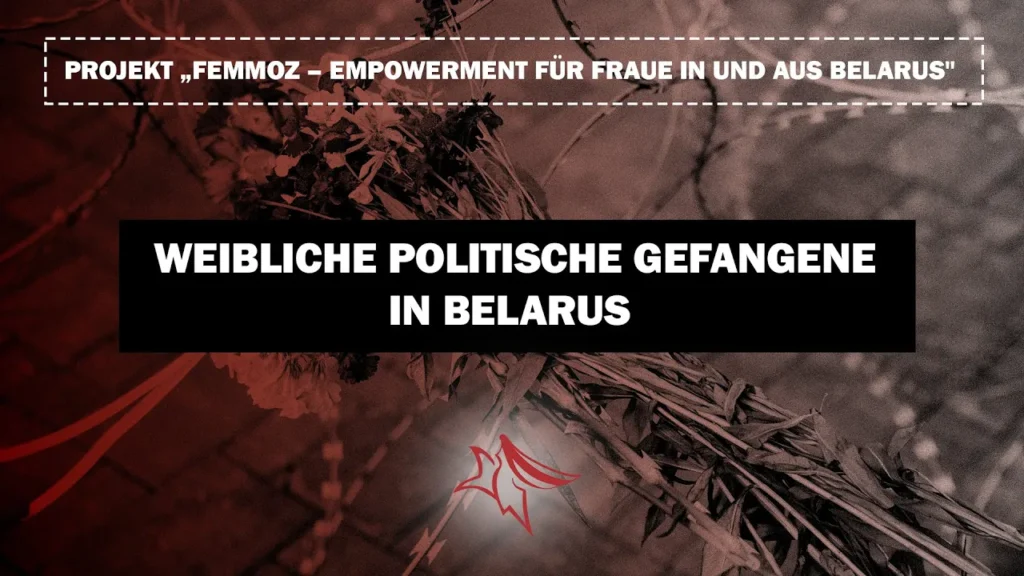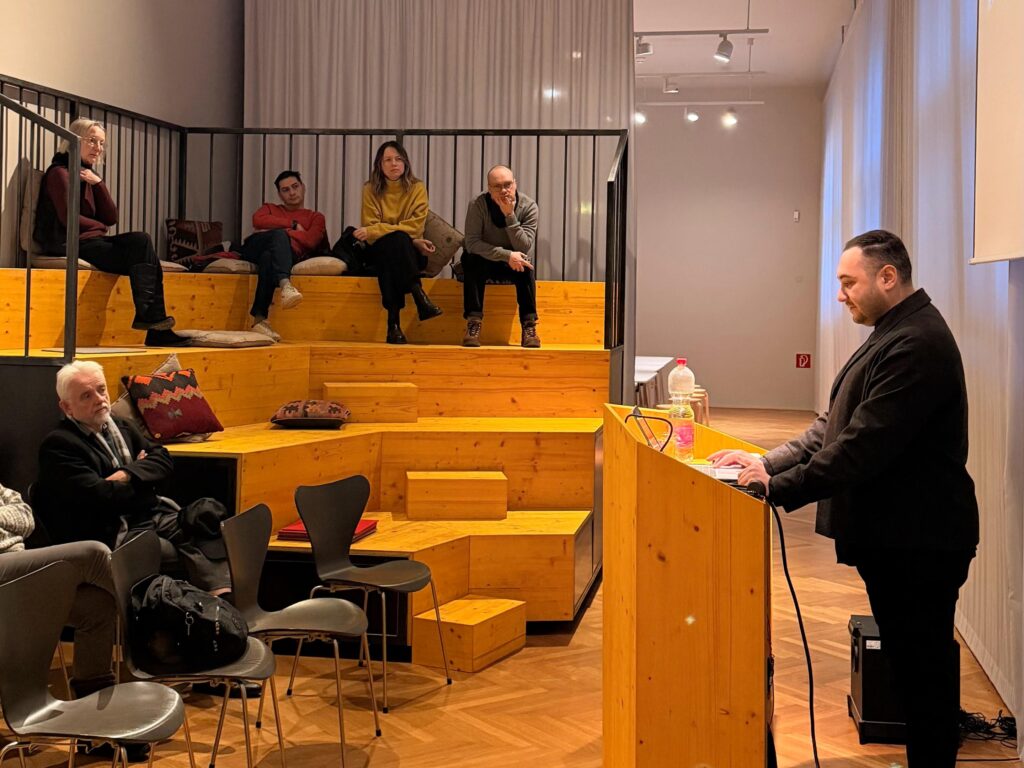Online discussion “Female political prisoners in Belarus”
There are more than 200 women political prisoners in Belarus. Behind this number are the stories of specific women, their families and loved ones, whose lives changed dramatically with arrest and imprisonment. What are the conditions of female political prisoners in Belarus and why is this group particularly vulnerable? Who is protecting their rights and how? What support do they need and what help is possible in the current situation? The recording of this discussion can be viewed here.
Panelists:
- Olga Gorbunova – released political prisoner and representative on social policy of the United Transitional Cabinet of Belarus
- Anna Limantava – representative of the German -Swiss human rights organization Libereco
Moderation:
- Nasta Bazar – a fem-queer grassroots activist and mother of two with a double forced emigration experience
What do women face and why are women a particularly vulnerable group, including when faced with persecution?
Belarusians often hear about political prisoners. However, when there are no occasions such as fundraising campaigns to support political prisoners, people, including journalists, are not ready or willing to address this issue. The reason is that Belarusian society is somewhat lost and confused in this matter because the situation is only getting worse, the Lukashenka regime continues repression, and the number of political prisoners keeps increasing every day.
It is unknown how many women in Belarus are imprisoned on political grounds. There is generally little understanding of what is happening in the country because people are in great fear. They do not report their cases to human rights defenders and do not speak about their cases publicly. They hope that their relatives can go through this experience with minimal public attention and the prisoners can receive a minimum sentence or house arrest.
More than a thousand people are known to have been prosecuted since 2020. At the same time, most public attention is focused on the more “well-known,” “famous” women political prisoners because they have relatives who advocate actively for their interests. For example, Tatsiana Khomich, Maryia Kalesnikava’s sister, has been traveling to different countries for three years already talking about her sister. Some communities, like journalists or lawyers, also advocate a lot so we know more about their cases. But we know very little about the hundreds of other women who are incarcerated. Probably most of their families are not even contacted, and these people are left to fend for themselves.
Speaking about the conditions of detention, it is important to say that it is only a myth that the authoritarian regime does not use violence against women. Many victims and eyewitnesses have already confirmed that at the moment of detention, women were subjected to violence, including sexualized violence, and threats.
Women are often threatened not only with violence but also with action against their children. Some political prisoners have been deprived of their parental rights and custody of their children. As for the conditions of detention, it is important to note that women have unique needs. The worst part is that medications are not provided in pre-trial detention centers, and there is no access to doctors. While spending extended periods in correctional facilities, women cannot timely consult a gynecologist, mammologist, or other specialists. They lose the precious time needed for diagnosis. Such stressful and traumatic events as imprisonment can also lead to cancer. Timely health monitoring is impossible in prisons. This may lead to catastrophic consequences when the untimely detection of diseases poses serious health risks, and possibly the loss of health and life.
It is worth mentioning that women, just like men, find it difficult to endure solitary confinement, punishment cells, or prison transfers. Some women are sent for compulsory psychiatric treatment, as in the case of the widow of Andrei Zeltsar, who was killed by the regime’s security forces. Many women have been sentenced to restricted freedom rather than imprisonment. And it becomes a blind spot. Women who are placed under house arrest cease to be political prisoners for some human rights initiatives like for the coalition that includes the human rights center “Viasna” and others. This approach makes it seem like restricted freedom equals freedom, which is not true.
Some women provide prison “management”. These are the wives, sisters, and mothers of the prisoners. People who stay in the country are essentially held hostage because there is no one else to help their loved ones who are in prison. It is a huge burden and a huge risk. Darya Losik, who stayed in the country to help and support her husband, is now in prison herself. Because it is a crime to stand up to the system all the time, bring care packages, write appeals and statements, or give interviews.
The LGBTQ+ community is another vulnerable group. Homosexual women are subjected to a lot of harassment in prisons. The administrations use this private information against prisoners. They pit other prisoners to fight LGBTQ+ women, and this leads to conflicts and attacks.
How should we support people who have had this experience? How to support people whose relatives or loved ones are incarcerated and how to support people who have had the experience of incarceration?
The worst thing is when a woman has children. Because children are a major lever of pressure the regime uses against women. Women are also subjected to more moral and physical violence.
This happens because the Belarusian society is patriarchal. Therefore, women face much more physical and emotional abuse. For example, women have to unload truckloads of vegetables delivered to prisons.
Libereco is a Swiss-German organization that focuses on human rights in Ukraine and Belarus. Its program #WeStandBYyou engages MPs from Germany and European countries in supporting families of political prisoners in Belarus. An MP may take on a symbolic duty to be a godparent to a political prisoner in Belarus. Then families of political prisoners receive different kinds of assistance. MPs often meet with other MPs and other politicians and inform them that they are godparents to political prisoners. This means that political prisoners remain in the public eye, they are talked about. This keeps the public aware.
Libereco carries out projects that help not only political prisoners but also people involved in various projects with political prisoners, as well as the people who have been released from prisons. In 2020, the social and psychological support service FENIKS was established to help individuals cope with stress. In 2022, FENIKS provided 2500 crisis consultations to more than 500 people, and 100 online and offline training sessions on how to better cope with stress and trauma. These training sessions involved groups ranging from 10 to 50 participants. They held 65 meetings for 13 psychological support groups. 80 volunteers participated in them online from various cities in Europe.
When it comes to the assistance needed, people who are released from prisons primarily need psychological support. After they are released, political prisoners need time to recover. They have to leave Belarus, after which they need time to recover both physically and mentally.
Who defends the rights of political prisoners in Belarus? What else should be done in this regard?
As for the rights of political prisoners, all human rights initiatives and solidarity funds help both men and women. However, there is a need for specialized fundraising programs or initiatives like Politvyazynka, which focuses specifically on fundraising and media promotion of cases of politically imprisoned women.
It is important to discuss that the entire issue of supporting political prisoners has come down to aid. But it is also crucial to seek release for all political prisoners. It has been three years since the crackdown started in Belarus, and Belarusians have not seen successful cases of releasing political prisoners through means like pressure on the regime. Therefore, people feel despair and do not believe that their actions can lead to real changes – such as improvement of conditions in places of detention. It is only a short-term priority to restore the right of political prisoners to correspondence and the right to have meetings with their loved ones. The long-term goal would be to achieve their release. In other words, all efforts of civil society are currently focused solely on providing assistance and advocating. But more should be done.




